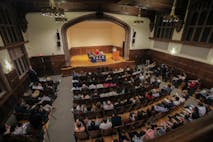
Judge: Planned Parenthood can ignore Trump's EO on gender ideology
Victoria Bergin
·We are urgently seeking 500 new Life Defenders (monthly supporters) before the end of October to help save babies from abortion 365 days a year. Your first gift as a Life Defender today will be DOUBLED. Click here to make your monthly commitment.

EXCLUSIVE: Dr. Catherine Pakaluk discusses what drives people to have large families
In an exclusive interview with Live Action's Sami Parker, economist and author Dr. Catherine Pakaluk discussed what drives some parents to embrace having multiple children, what helps them thrive, and how we can build a culture that supports them.
Dr. Catherine Pakaluk is an economist and author of the book, "Hannah's Children."
She told Live Action's Sami Parker that the falling birth rate is contributing to the rise in individualism.
She explained that children have come to be viewed as a "problem to be solved" when they are really a "gift."
She believes the best way to inspire people to have more children is by "old-fashioned witness."
While working in a lab in the 1990s helping to conduct research on the AIDS epidemic in Africa, Pakaluk noticed "a lot of people kind of 'over the water cooler' proverbially would say things like, 'Well at the end of the day, it isn't really such a bad thing that Africa will have so much of this burden from AIDS because everyone knows there's too many people in Africa.'"
She continued, telling Parker:
And obviously, as an idealistic, you know, pro-life young woman, I was just horrified. I thought, wait, so on the one hand, we're supposed to cure this terrible disease or look for treatments, but on the other hand, we should sort of silently be pleased that maybe the population will be reduced because of this disease. It's... distressing to think about.
This led her to ask questions, including, "Are there too many people just in general? Are there too many people in Africa? Are there too many people anywhere?"
She said that, as a Christian, "it would be hard for me to believe that God set up the world in such a way that we would have to cheer for disease. But I thought, well, who really knows the answer to this?"
Those questions inspired her to study economics in graduate school. She also married a widower, became the stepmother of his six children, and welcomed eight more children with him.
As her career and motherhood moved forward, she saw the trend of falling birth rates around the globe and the efforts of governments to attempt to boost the birth rate.
Instead of asking why people weren't having children or why they were having fewer children than couples in the past, Pakaluk asked who are having more children than "normal" and what is driving them to do so. That was the birth of her book, "Hannah's Children." One of the interesting arguments of the book is that birth rates shouldn't be looked at from a national level alone — as far as having enough people to enter the workforce — but from a more personal level.
"I think probably the most important thing which is universal is that as the numbers of children per household decline for a given population size, people have fewer aunts and uncles, they have fewer cousins, they have fewer brothers and sisters," said Pakaluk. "And so what that means is that actually in a deep way, people are ... they're less connected to each other, right?... Their whole line, in a sense, can just be in their single nuclear family. That is something that over time I think creates a kind of learned... or sort of accidental individualism."

Individualism can put the focus on an individual's wants rather than community or family needs, reducing feelings of empathy and compassion and increasing isolation and indifference. In 2024, Pope Francis wrote, "The problem of our world is not the children that are born: it is the selfishness, consumerism and individualism, which leave people satisfied, alone and unhappy."
Pakaluk explained that, based on her work, nations that are trying to "incentivize people to have children" are not seeing success and these incentives could be seen as coercive.
Dear Reader,
Every day in America, more than 2,800 preborn babies lose their lives to abortion.
That number should break our hearts and move us to action.
Ending this tragedy requires daily commitment from people like you who refuse to stay silent.
Millions read Live Action News each month — imagine the impact if each of us took a stand for life 365 days a year.
Right now, we’re urgently seeking 500 new Life Defenders (monthly donors) to join us before the end of October. And thanks to a generous $250,000 matching grant, your first monthly gift will be DOUBLED to help save lives and build a culture that protects the preborn.
Will you become one of the 500 today? Click here now to become a Live Action Life Defender and have your first gift doubled.
Together, we can end abortion and create a future where every child is cherished and every mother is supported.
"So each couple should prayerfully consider what they're being called to do," she said. "I firmly believe that. So what governments can do on the one hand, I think, is sort of what they ought to be doing, is aim at the conditions in which couples who are called to welcome children can do so."
She added:
[T]he reasons people choose to have children are deep and subjective and usually tied to questions related to the meaning of life. And that is the reason, it seemed to me, why these, sort of little government handouts, like, here's a baby bonus or whatever, they might be good to do for other reasons, but they don't persuade people to have children.
She believes the best way to inspire couples to have more children is through "old-fashioned witness." When parents speak about their children in positive ways, it can help others feel good about having children.
"We have forgotten how powerful witness and testimony is," she explained. "... I actually think that really the most important thing we can do to kind of persuade people to have children who are not considering it is just share. Share our experiences with our children. Tell the good stories. ... It's not going to ruin your life to have a baby."
She added that as a society, "We are so deep into this idea that a baby is a problem to be solved."
She explained:
Obviously, there are some circumstances in which we can accidentally or, maybe not accidentally, conceive children in less than ideal circumstances. ... I think the challenge is to see that even in those less than ideal circumstances, a child is a gift. A child is a blessing. A child is infinite worth and dignity, even conceived in rape, even conceived in the worst circumstances.
She explained that most of the people she has spoken to who have several children "discovered that the child solved a problem..."
She recalled one mother who conceived a baby unexpectedly, and "they were really struggling at the time with one of their older children who was maybe 11 or 12, a son who was struggling with a lot of mental health problems, but in particular very, very extreme anxiety."
Therapists and medication didn't seem to be helping, and then they were unexpectedly pregnant.
The mother asked God why he sent the baby when she was trying to help her older son. Pakaluk recalled: "And she said... 'Well, the baby came, and actually this baby kind of went into the arms of the older boy that was struggling.... And my son just calmed down. It was like this peace came over him.'...It was as if he just needed to hold that baby."
Live Action News is pro-life news and commentary from a pro-life perspective.
Contact editor@liveaction.org for questions, corrections, or if you are seeking permission to reprint any Live Action News content.
Guest Articles: To submit a guest article to Live Action News, email editor@liveaction.org with an attached Word document of 800-1000 words. Please also attach any photos relevant to your submission if applicable. If your submission is accepted for publication, you will be notified within three weeks. Guest articles are not compensated (see our Open License Agreement). Thank you for your interest in Live Action News!

Victoria Bergin
·
Media
Sheena Rodriguez
·
Media
Kelli Keane
·
Analysis
Nancy Flanders
·
Human Rights
Nancy Flanders
·
Media
Kelli Keane
·
Fact Checks
Nancy Flanders
·
International
Nancy Flanders
·
Politics
Nancy Flanders
·
Activism
Nancy Flanders
·
International
Nancy Flanders
·